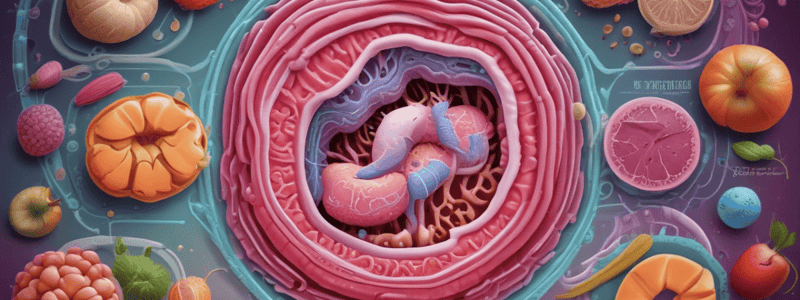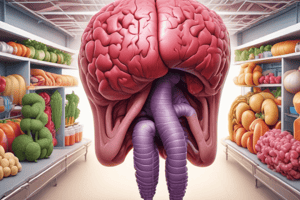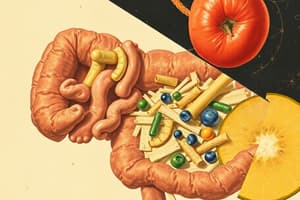Podcast
Questions and Answers
What is the primary function of the gallbladder in the digestive system?
What is the primary function of the gallbladder in the digestive system?
- To absorb nutrients from the small intestine
- To contract and expel waste products from the body
- To secrete enzymes for chemical digestion
- To store and concentrate bile for fat digestion (correct)
Which of the following is NOT a primary function of the digestive system?
Which of the following is NOT a primary function of the digestive system?
- Regulation of body temperature (correct)
- Ingestion
- Chemical digestion
- Mechanical digestion
What is the role of the pancreas in the digestive system?
What is the role of the pancreas in the digestive system?
- To contract and move food through the large intestine
- To store undigested food for later elimination
- To produce enzymes and hormones for digestion and absorption (correct)
- To secrete bile for fat digestion
Which part of the digestive system is responsible for the mechanical breakdown of food?
Which part of the digestive system is responsible for the mechanical breakdown of food?
What is the primary function of the large intestine in the digestive system?
What is the primary function of the large intestine in the digestive system?
Which of the following is not a part of the human digestive system?
Which of the following is not a part of the human digestive system?
What is the main purpose of chemical digestion in the digestive system?
What is the main purpose of chemical digestion in the digestive system?
Which organ in the digestive system is responsible for the absorption of nutrients?
Which organ in the digestive system is responsible for the absorption of nutrients?
What is the role of the rectum and anus in the digestive system?
What is the role of the rectum and anus in the digestive system?
What is the primary purpose of mechanical digestion?
What is the primary purpose of mechanical digestion?
Where does most absorption of nutrients occur in the digestive system?
Where does most absorption of nutrients occur in the digestive system?
What is the role of enzymes, acids, and bile in the digestive system?
What is the role of enzymes, acids, and bile in the digestive system?
What is the name of the partially digested food mixture that enters the small intestine?
What is the name of the partially digested food mixture that enters the small intestine?
Where do the absorbed nutrients travel to after being taken up from the small intestine?
Where do the absorbed nutrients travel to after being taken up from the small intestine?
What is the final step in the digestive process?
What is the final step in the digestive process?
Which of the following is NOT a function of the digestive system?
Which of the following is NOT a function of the digestive system?
What is the role of the liver in the digestive process?
What is the role of the liver in the digestive process?
What is the main purpose of the digestive system?
What is the main purpose of the digestive system?
Which of the following is NOT a step in the digestive process?
Which of the following is NOT a step in the digestive process?
Study Notes
Digestive System: Understanding Food Processing from Mouth to Anus
The digestive system is a complex network of organs and processes that work together to transform the food we eat into energy, nutrients, vitamins, minerals, and other essential molecules for growth, cell repair, immune function, and all body processes. This article will delve into the digestive system's structure, functions, and mechanisms, providing insights into how our bodies process food from mouth to anus.
Structure of the Digestive System
The human digestive system primarily consists of the following organs:
- Mouth
- Esophagus
- Stomach
- Liver
- Pancreas
- Gallbladder
- Small intestine
- Large intestine
- Rectum and anus
Each organ plays a distinct role in the overall digestive process.
Functions of the Digestive System
The primary functions of the digestive system include:
- Ingestion: The process of taking in food by biting and chewing.
- Mechanical digestion: The process of breaking down food into smaller pieces by the contraction of muscles in the esophagus and stomach.
- Chemical digestion: The process of breaking down food into simpler substances by enzymes, acids, and bile.
- Absorption: The process of transporting food molecules from the small intestine into the bloodstream.
- Elimination: The process of removing undigested food and waste products from the body.
Mechanisms of the Digestive System
The digestive system employs several mechanisms to ensure the efficient processing of food:
Mechanical Digestion
Mechanical digestion is the process of breaking down large pieces of food into smaller ones using teeth and muscles. The chewing action mechanically breaks apart solid food particles, allowing for easier chemical digestion later on.
Chemical Digestion
Chemical digestion involves the use of enzymes, acids, and bile produced by the digestive system organs to break down complex molecules such as proteins, carbohydrates, lipids, nucleic acids, and polysaccharides into simpler accessible forms.
Absorption
Absorption occurs mostly within the small intestine, where nutrients are taken up from the chyme (the partially digested food mixture) into the bloodstream. This occurs through specialized cells called enterocytes that line the small intestine. Once absorbed, these nutrients travel to the liver via hepatic portal vein, which provides glucose, amino acids, and other substances to various body parts.
Elimination
Undigested food and waste products move from the stomach to the large intestine, then to the rectum before being expelled from the body through the anus. This process is known as defecation or elimination.
Conclusion
The digestive system plays a crucial role in maintaining our health by processing food into energy, nutrients, vitamins, minerals, and other essential molecules for body processes. Understanding this complex network of organs and their functions helps us appreciate how we transform the foods we eat into substances that fuel our bodies and sustain life.
Studying That Suits You
Use AI to generate personalized quizzes and flashcards to suit your learning preferences.
Description
Explore the structure, functions, and mechanisms of the digestive system from mouth to anus. Learn how organs like the stomach, liver, and small intestine work together to process food through ingestion, mechanical digestion, chemical digestion, absorption, and elimination.




